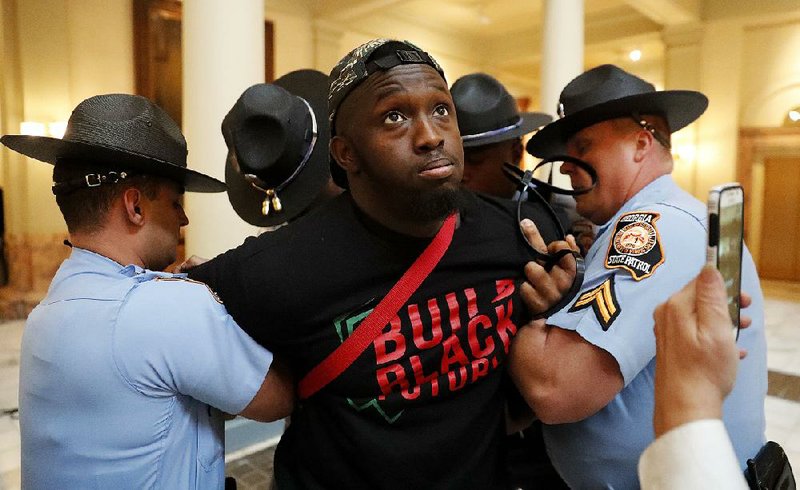A federal judge has barred the Georgia secretary of state's office from immediately certifying election results to allow more time to address problems with thousands of provisional ballots that voters were forced to cast last week.
On Tuesday morning, in a separate case, a federal judge ordered Gwinnett County to stop rejecting absentee ballots with missing or incorrect birth dates. The ruling by U.S. District Judge Leigh Martin May addresses concerns raised by voting rights advocates on behalf of several voters and by Carolyn Bourdeaux, the Democratic candidate who challenged Rep. Rob Woodall in the state's 7th Congressional District. Bourdeaux is hoping to either overtake Woodall in the vote count or force a recount.
Tuesday was the deadline for Georgia's 159 counties to certify their elections results, and the secretary of state had planned to certify those results today. But U.S. District Judge Amy Totenberg said late Monday that the secretary of state's office could not certify results before Friday and that it had to "immediately establish and publicize on its website a secure and free-access hotline or website for provisional ballot voters to access to determine whether their provisional ballots were counted and, if not, the reason why."
The ruling in the suit brought by Common Cause means a few more days of uncertainty about the Georgia governor's race, in which Democrat Stacey Abrams is hoping to force a runoff with Republican Brian Kemp, who is leading by about 59,000 votes. Kemp, who resigned as secretary of state last week and declared victory, said that there are not enough outstanding votes to keep him from claiming the office.
"Today's ruling is a victory for the voters of Georgia. We are all stronger when every eligible voter is allowed to participate in our elections," Sara Henderson, executive director of Common Cause Georgia, said late Monday in a statement. "This victory helps achieve greater voter confidence in our elections."
Lauren Groh-Wargo, Abrams' campaign manager, said in a statement: "The rulings from last night and this morning were wins for Georgians' fundamental right -- the right to cast a ballot. Given the confusion sowed by the Secretary of State's office last week and the number of voters who experienced irregularities regarding their registration status, these victories were necessary steps in the fight to count every eligible vote in Georgia."
Kemp campaign spokesman Ryan Mahoney said, "While Democrats attempt to undermine Brian Kemp's convincing victory seven days ago, we remain confident in the local elections officials who are certifying the results."
The secretary of state's spokesman, Candice Broce, said, "The secretary of state's office is reviewing the order and considering our options with legal counsel."
The secretary of state's office has reported that 21,190 provisional ballots were cast in the Nov. 6 election. The Abrams campaign has said the number is more than 27,000. Voters are given provisional ballots if their registrations don't show up in voter rolls at their precincts or if they don't have proper identification.
The suit refers to testimony from Chris Harvey, the state director of elections, that typically only half of the provisional ballots cast will probably be counted because of problems.
Voters had until Friday to prove that they were duly registered or to prove their identities. The lawsuit names voters who said they were not given proper information about how to fix their ballots.
Abrams has filed her own lawsuit asking for a delay in certification of the results and to require election officials in two counties to stop summarily rejecting absentee ballots with minor discrepancies, as well as to accept provisional ballots from voters whose voter registration records were not updated to reflect their new addresses. Abrams would need at least 21,000 additional votes to force a runoff and just over 19,000 to initiate a recount.
Tuesday's ruling in the Gwinnett case came a day after Bourdeaux filed an emergency motion asking that the county be required to count ballots of voters who were properly registered but whose ballots were rejected for minor discrepancies. The suit argues that voters should be given the chance to correct issues flagged by county elections officials. The campaign estimates that 900 to 1,000 ballots are at issue. The lawsuit refers to 323 affected ballots.
A Section on 11/14/2018
